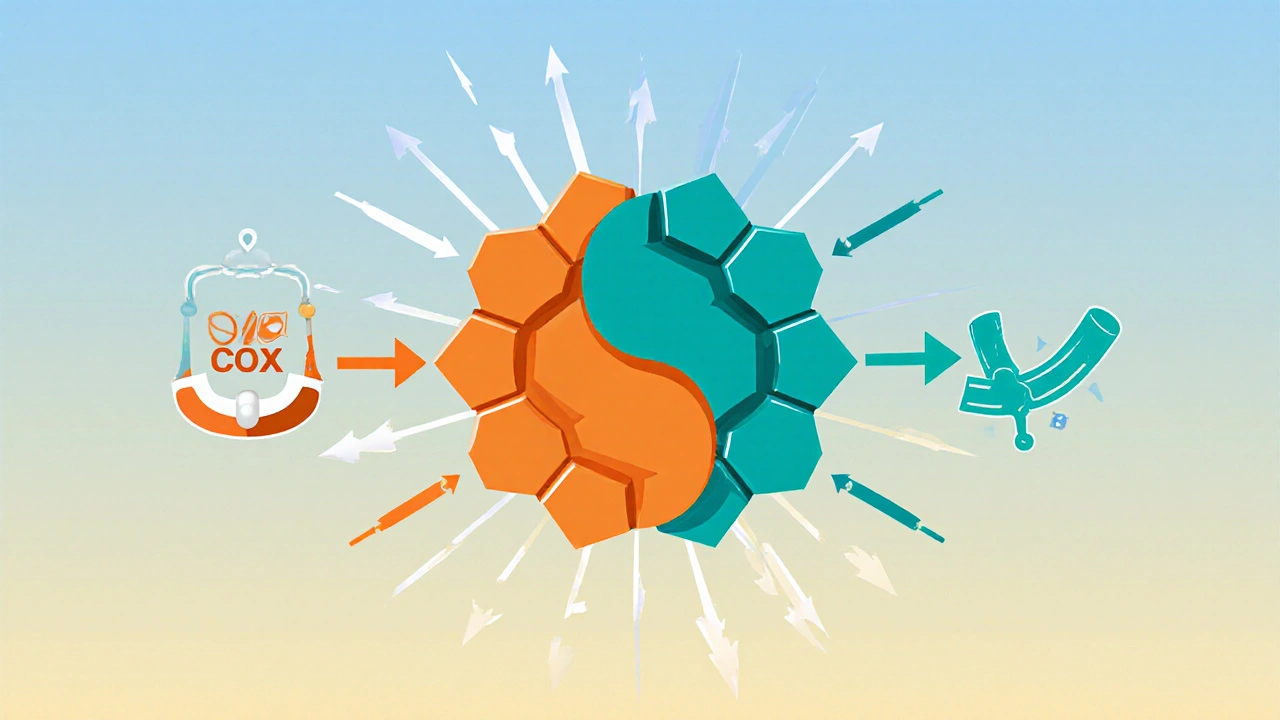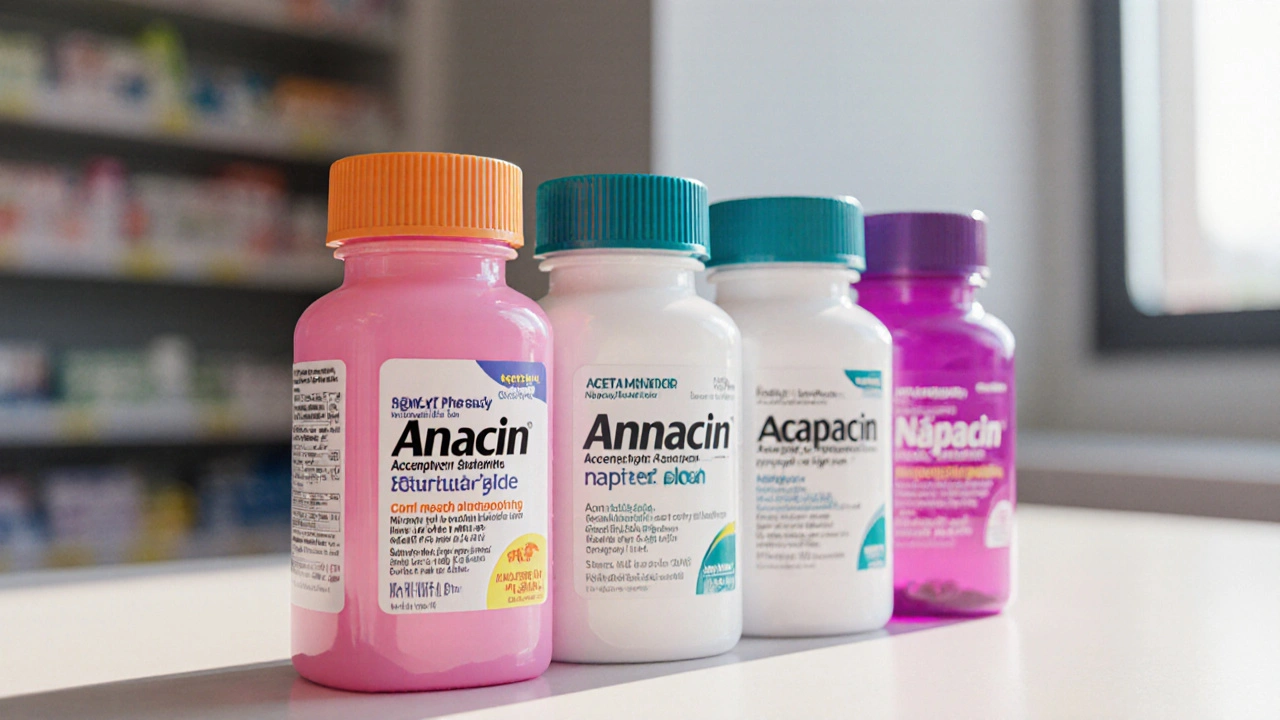Pain Relief Matchmaker
Find the best over-the-counter pain relief for your specific situation based on symptoms, health conditions, and relief needs.
Answer these questions to get your recommendation
Your Recommended Pain Reliever
Active ingredients:
Looking for a quick, reliable way to knock out a headache, muscle ache, or minor fever? You’ve probably seen the pink‑capped box of Anacin comparison at the pharmacy and wondered how it stacks up against the other over‑the‑counter (OTC) options. This guide breaks down what’s inside Anacin, how it works, and when you might reach for a different pill instead.
Key Takeaways
- Anacin combines aspirin (a salicylate) with caffeine, delivering fast pain relief and a boost in alertness.
- Ibuprofen (Advil, Motrin) and naproxen (Aleve) are non‑salicylate NSAIDs that tend to be gentler on the stomach.
- Acetaminophen (Tylenol) is best for fever and mild pain without the anti‑inflammatory effect.
- Excedrin adds acetaminophen to aspirin and caffeine, offering a stronger punch for migraines.
- Consider age, stomach sensitivity, bleeding risk, and how quickly you need relief before choosing.
What Is Anacin?
Anacin is a combination analgesic that pairs aspirin, a salicylate anti‑inflammatory, with caffeine, a mild stimulant. First launched in the 1930s, the product is marketed for headache, minor arthritis, and fever. Each regular tablet typically delivers 325mg of aspirin and 30mg of caffeine.
How Anacin Works
The aspirin component blocks cyclo‑oxygenase (COX‑1 and COX‑2) enzymes, reducing prostaglandin production and thus inflammation and pain. Caffeine, on the other hand, constricts cerebral blood vessels and antagonizes adenosine receptors, which helps cut headache‑related vasodilation and adds a modest alertness boost. The synergy can make Anacin feel faster‑acting than aspirin alone.

Common Alternatives
Below are the most widely used OTC pain relievers you’ll find on the same shelves.
- Ibuprofen is a non‑salicylate NSAID that reduces inflammation, pain, and fever by inhibiting COX enzymes. Brands include Advil and Motrin. Typical dose: 200mg per tablet.
- Acetaminophen (also sold as Tylenol) works mainly in the brain to reduce pain and lower temperature. It does not have significant anti‑inflammatory effects. Typical dose: 325-500mg per tablet.
- Naproxen is a longer‑acting NSAID (brand Aleve) offering up to 12hours of relief. Dose: 220mg per tablet.
- Excedrin blends acetaminophen, aspirin, and caffeine, targeting migraines and severe tension headaches. Dose: 250mg acetaminophen, 250mg aspirin, 65mg caffeine per tablet.
Side‑Effect Profile at a Glance
| Medication | Active Ingredients | Typical Onset | Duration | Common Side Effects | Best For |
|---|---|---|---|---|---|
| Anacin | Aspirin325mg + Caffeine30mg | 15-30min | 4‑6hrs | Stomach irritation, increased heart rate | Headaches, mild inflammation |
| Ibuprofen (Advil) | Ibuprofen200mg | 20-40min | 6‑8hrs | GI upset, occasional kidney strain | Muscle aches, joint pain |
| Acetaminophen (Tylenol) | Acetaminophen325‑500mg | 30-60min | 4‑6hrs | Liver toxicity at high doses | Fever, mild to moderate pain |
| Naproxen (Aleve) | Naproxen220mg | 30-45min | 8‑12hrs | Stomach upset, cardiovascular risk | Long‑lasting inflammation |
| Excedrin | Aspirin250mg + Acetaminophen250mg + Caffeine65mg | 15-30min | 4‑6hrs | Stomach irritation, potential rebound headache | Migraines, severe tension headaches |
Choosing the Right Option
When you compare these meds, ask yourself a few practical questions:
- Do you have a sensitive stomach? Aspirin‑based combos (Anacin, Excedrin) can provoke gastritis, especially without food. Ibuprofen and naproxen are also NSAIDs, but many find them a bit easier on the gut when taken with meals.
- Is bleeding risk a concern? Aspirin inhibits platelet function, raising bleed risk for people on blood thinners or with ulcers. Acetaminophen has no effect on platelets.
- How fast do you need relief? Caffeine’s vasoconstriction often speeds up headache relief, giving Anacin and Excedrin an edge for sudden throbbing.
- Do you need long‑lasting coverage? Naproxen’s 12‑hour window outlasts most 4‑6 hour options, making it ideal for chronic arthritis.
- Any liver or kidney considerations? High‑dose acetaminophen can strain the liver; high‑dose ibuprofen/Naproxen can affect kidneys, especially in older adults.
Match your answer to the medication that scores best on the relevant criteria.

Safety Tips & Common Pitfalls
- Never double‑dose. Two tablets of Anacin equal 650mg aspirin - already near the daily max for many adults.
- If you’re pregnant, avoid aspirin‑caffeine combos unless your doctor says otherwise; acetaminophen is generally safer.
- Watch out for hidden caffeine. Some energy drinks or coffee can push total caffeine over 400mg, leading to jitters.
- People with hypertension should be cautious with caffeine‑containing products; the stimulant effect can raise blood pressure.
- Always read the label for “extra‑strength” variants - they may contain 500mg aspirin per tablet.
Quick Checklist Before You Grab a Bottle
- Do you have any stomach ulcers or a history of GI bleeding?
- Are you on anticoagulant medication (e.g., warfarin, clopidogrel)?
- Do you have liver disease or consume alcohol heavily?
- Is rapid relief more important than duration?
- Do you need a caffeine boost or would it cause unwanted jitteriness?
If you answered “yes” to the first two, lean toward acetaminophen or a low‑dose NSAID without aspirin. If you need a quick head‑clear, Anacin or Excedrin may be worth a try.
Frequently Asked Questions
Can I take Anacin if I’m already on blood thinners?
No. The aspirin in Anacin interferes with platelet aggregation, which can amplify the anticoagulant effect and raise bleeding risk. Talk to your doctor for a safer alternative.
Is the caffeine in Anacin enough to replace my morning coffee?
Only about 30mg per tablet, roughly a third of an average cup of coffee. It can perk you up a bit, but it won’t fully substitute for a regular coffee habit.
What’s the biggest advantage of Excedrin over Anacin?
Excedrin adds acetaminophen, giving a stronger analgesic punch for migraines while still leveraging aspirin and caffeine for rapid relief.
Can I use Anacin for menstrual cramps?
Yes, the anti‑inflammatory action of aspirin can help, but many women find ibuprofen or naproxen more effective and gentler on the stomach.
How many Anacin tablets are safe in 24hours?
For adults, keep total aspirin under 4g per day. That translates to a maximum of 12 regular‑strength Anacin tablets (12×325mg=3.9g). Always follow label directions and avoid exceeding the stated limit.

Garrett Gonzales
October 13, 2025 AT 14:38When you weigh Anacin against its OTC peers, the pharmacokinetic profile matters as much as the active moiety. Aspirin’s irreversible COX‑1 inhibition curtails thromboxane A2 synthesis, while the 30 mg caffeine acts as a central adenosine antagonist, accelerating analgesic onset. Compared to ibuprofen’s reversible COX inhibition, the aspirin component yields a longer half‑life but also greater gastric mucosal risk. In patients with ulcer history, a COX‑2 selective NSAID such as celecoxib could be a safer alternative, albeit at a higher cost. For rapid headache relief under 30 minutes, the caffeine boost often tips the scales in favor of Anacin.
Aman Deep
October 13, 2025 AT 16:01Ah the dance of pills on the pharmacy shelf 🌟 the modest caffeine whispering through aspirin’s thunderous roar it feels like sunrise in a bottle 😌
Herman Bambang Suherman
October 13, 2025 AT 17:40Stick to the recommended dose and take it with food if your stomach’s sensitive.
Meredith Blazevich
October 13, 2025 AT 19:03I get why the caffeine kick can feel like a lifesaver when a migraine pummels you-like a sudden burst of light in a dark tunnel. But imagine the aftermath: that jittery edge that can turn a productive day into a shaky performance. It’s a trade‑off, a balance between speed and serenity. If you’re prone to anxiety, the extra caffeine could amplify those nerves, making the relief feel like a fleeting mirage. For many, a simple Tylenol or ibuprofen may offer smoother sailing, even if it takes a few minutes longer. And don’t forget the gut-aspirin isn’t the friendliest roommate for a sensitive stomach. In the end, knowing your own body is the compass that guides you to the right choice.
Nicola Gilmour
October 13, 2025 AT 21:00Hey folks, if you’re battling a dull muscle ache, give ibuprofen a try first-its anti‑inflammatory action is solid. Remember to hydrate and consider a warm compress; combined approaches often work best. You’ve got this!
Teknolgy .com
October 13, 2025 AT 22:40Ugh, another caffeine‑laden headache fix 🙄. Sure, it works fast, but then you’re wired for the rest of the day. 🤦♂️
Caroline Johnson
October 14, 2025 AT 00:36Let’s be crystal clear: mixing Anacin with blood thinners is a red flag!!! The aspirin component will exacerbate bleeding risks, and the caffeine can complicate cardiovascular stability... If you’re on anticoagulants, absolutely avoid this combo!!!
Megan Lallier-Barron
October 14, 2025 AT 02:33Interesting take, but I still think the extra caffeine is overrated 😐. Some people swear by it, yet many just end up shaking. 🤷♀️
Kelly Larivee
October 14, 2025 AT 04:46Stomach issues? Skip aspirin.
Emma Rauschkolb
October 14, 2025 AT 07:00When you consider the pharmacodynamic synergy, the caffeine‑aspirin matrix leverages central nervous system stimulation to enhance analgesic perception-essentially a neurochemical boost. Yet the gastrointestinal mucosa bears the brunt, especially with chronic use. 🚑
Kaushik Kumar
October 14, 2025 AT 09:13Great summary! Remember to watch your total daily aspirin intake-exceeding 4 g can lead to serious toxicity. Also, stay hydrated; NSAIDs can affect kidney function if you’re dehydrated.
Mara Mara
October 14, 2025 AT 11:26Patriots, keep America healthy! 🇺🇸 Choose meds that won’t compromise your vigor-avoid unnecessary caffeine spikes that can jitter your nerves. Stick to tried‑and‑true options, and always read the label!!
Jennifer Ferrara
October 14, 2025 AT 13:56In the grand tapestry of analgesic therapeutics, one must first acknowledge the multiplicity of mechanistic pathways that undergird nociceptive modulation. Anacin, comprising aspirin and caffeine, operates via dual prongs: the irreversible acetylation of cyclo‑oxygenase enzymes effectuates a diminution of prostaglandin synthesis, whilst caffeine, as a non‑selective adenosine antagonist, engenders vasoconstriction and augments central arousal. This synergism often yields a more expeditious alleviation of cephalic distress than monotherapy with either constituent alone. However, the pharmacovigilance landscape is replete with cautionary tales concerning gastric mucosal erosion, particularly in individuals with a antecedent of peptic ulcer disease. The aspirn component, by virtue of its non‑selective COX inhibition, predisposes to platelet dysfunction and, consequently, a heightened haemorrhagic propensity; this is of paramount concern for patients concurrently administered anticoagulants.
Conversely, ibuprofen, a reversible inhibitor of COX‑1 and COX‑2, typically presents a more favourable gastric profile when ingested with sustenance, albeit it is not devoid of renal considerations in volume‑depleted states. Acetaminophen, whilst eschewing anti‑inflammatory activity, offers a hepatically mediated analgesic effect, rendering it a suitable alternative for those with contraindications to NSAIDs, provided hepatic function is uncompromised and alcohol consumption is moderate.
When deliberating the optimal OTC choice, clinicians and consumers alike must weigh the temporal urgency of pain relief against the long‑term safety calculus. For acute migraine episodes where rapid onset is prized, the caffeine adjunct may confer a perceptible advantage. Yet, for chronic arthritic pain, agents such as naproxen, with its extended half‑life, may furnish superior durability.
In summation, Anacin occupies a niche wherein speed of relief is balanced against a modest elevation in gastrointestinal and cardiovascular risk. Prudence dictates that patients with known ulcer disease, hypertension, or coagulopathy elect for alternative therapies. Moreover, adherence to dosing ceilings-no more than 12 regular‑strength tablets per 24‑hour period-remains an immutable tenet of safe consumption. Future investigations should continue to elucidate the comparative efficacy of such combination analgesics in diverse patient cohorts.
Terry Moreland
October 14, 2025 AT 16:26Thanks for the detailed breakdown! For anyone with a sensitive stomach, I’d stick with acetaminophen or a low‑dose ibuprofen taken with food.
Abdul Adeeb
October 14, 2025 AT 19:13It is essential to observe the maximum daily aspirin limit, which is 4 grams for adults. Exceeding this threshold may result in serious gastrointestinal bleeding and should be avoided.
Abhishek Vernekar
October 14, 2025 AT 22:16While the science is clear, remember that over‑use can feel like a silent drain on your energy-don’t let the quick fix become a habit. 😊